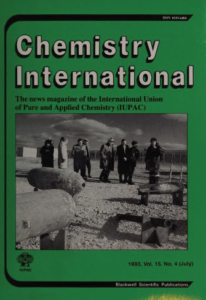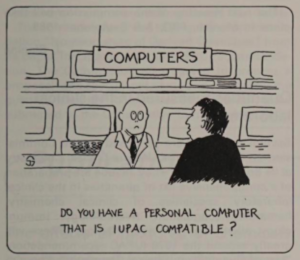 For about 24 years, from 1979 to 2003, Chemistry International was print only and easily recognizable with its glossy green cover. It was so green that it stained the readers fingers! Today, the early volumes of CI are freely available online. Always without stains.
For about 24 years, from 1979 to 2003, Chemistry International was print only and easily recognizable with its glossy green cover. It was so green that it stained the readers fingers! Today, the early volumes of CI are freely available online. Always without stains.
Working with the Internet Archive, the project of digitizing the print collection has been recently completed. The scanning and processing were managed by Tim Bigelow in Boston. For each volumes, high quality, text-searchable PDF files have been created. The collection is part of Internet Archive search and each volume is displayed via their open source Book Reader.
Making the collection available online is CI present to IUPAC100 and a gift to the community of scientists and historians especially interested in the stories surrounding the Union in the 80’s and 90’s. In the Epilogue of the CI Special IUPAC 100 issue (July 2019, p. 58), Brigitte Van Tiggelen issued a call to arms and asked anyone who has historical materials to share it. She and her colleagues, who contributed to that special issue, have presented fascinating accounts of specific aspects or point-in-time in the early years of the Union. A closer look in the last decades of the 20th century will no doubt be equally interesting. Therefore it became evident to this CI editor that one small step forward was to make CI archives digital and broadly available online.

Curious wonderers will rejoice flipping to these pages, discovering the Union recent past. Over the years, the styles evolved and each successive editors left their marks. To start, it was Martin Gellender till 1982, followed by Roger Fennell till 1985, and Michael Freemantle for about 10 years and till July 1994. Following that longer steady period Michael Ward appeared as acting editor for a couple of years and that till John Jost took the relay in 1997. Then, Alan Senzel managed CI from 1999 to 2001 and at last, starting in 2002, Fabienne Meyers morphed CI into the magazine you still receive today, implementing colors and an online version in 2003.
The Internet Archive is a non-profit building a digital library of Internet sites and other cultural artifacts in digital form. Like a paper library, they provide free access to researchers, historians, scholars, the print disabled, and the general public. It began in 1996 by archiving the Internet itself. Today they have 20+ years of web history accessible through the Wayback Machine and they work with 625+ library and other partners through their Archive-It program to identify important web pages.
https://archive.org/details/chemistryinternational
(announcement published in Chem Int Oct 2020)
